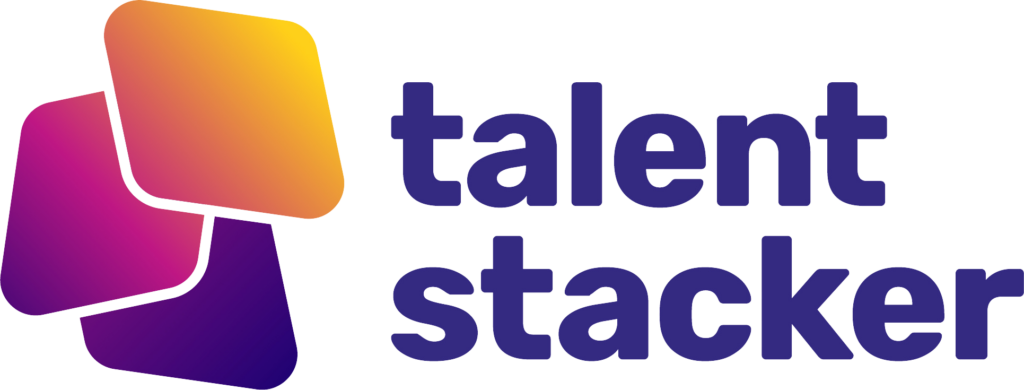Feeling anxious about your upcoming interview?
Here at Talent Stacker, we understand the apprehension that interviews can bring. However, with thorough preparation and a solid understanding of the most common Salesforce interview questions, you can approach your interviews with confidence and significantly increase your chance of success. Our Ultimate Salesforce Job Interview Guide is designed to provide you with strategies to ace your next Salesforce job interview. From helpful tips for preparation, to the top 20 most common questions we are seeing across the market in actual interviews and effective answering strategies – we have you covered. Without a doubt, this guide will be an invaluable resource for your next Salesforce job interview.

What We Will Cover In This Guide
- Preparing for a Salesforce interview
- Skills required for Salesforce roles
- Competitiveness in the Salesforce job market
- 20 Common Salesforce interview questions and answers (from real interviews)
- Additional Free and Helpful Resources

Preparing For A Salesforce Interview!
When interviewing for a Salesforce position, it may seem overwhelming at first. However, you can increase your chances of success by implementing a few straightforward strategies.
- Do your research
The first step to preparing for an interview is to research the company and the position. This will help you understand what the company is looking for in a candidate and how your skills and experience align with the role.
Here are some ways to research the company:
- Visit the company’s website. Read about the company’s history, mission, and values. Look for information about the company’s products or services, and its target market.
- Review the company’s social media pages. Follow the company on social media to get a sense of its culture and its employees. Look for recent news and updates about the company.
- Read news articles about the company. This can help you understand the company’s industry, its competitors, and its recent financial performance.
Here are some ways to research the position:
Read the job description carefully. Pay attention to the specific skills and experience that the company is looking for. Look up individuals who work for the company on LinkedIn. This can help you learn more about the company culture and the types of projects that employees work on.
When you can come to the interview prepared and confident by doing your research, you will be able to answer the interviewer’s questions intelligently, and you will be better prepared to articulate why you are a good fit for the position.
- Practice your answers to common interview questions
There are a few common interview questions that you can expect to be asked in a Salesforce interview. These questions may include:
- Tell me about yourself.
- Why are you interested in this position?
- What are your strengths and weaknesses?
- What do you know about Salesforce?
- What are your career goals?
Practicing your answers to these questions will help you feel more confident during the interview. We recommend setting up time with a trusted colleague or friend to practice saying your answers to these questions out loud and garnering feedback. You can also record your answers and re-watch the recording to review how you present yourself on camera and convey your answer.
We’ve included videos and short summaries of the 20 most commonly asked questions on job interviews across different roles and industries below.
- Dress professionally
First impressions matter, so it’s important to dress professionally for your interview. This doesn’t mean that you have to wear a suit, but you should dress in neat, clean, and business-appropriate attire, even if you’re on Zoom!
- Be enthusiastic
One of the most important things you can do in a Salesforce interview is to be enthusiastic. Show the interviewer that you’re excited about the position and the Salesforce platform.
You can do this by smiling, making eye contact, and being engaged in the conversation. You should also be prepared to ask questions about the company and the position. This will show the interviewer that you have done your research on the company and you are going beyond the surface level.
- Follow up after the interview
After the interview, be sure to send a thank-you note to the interviewer. This is a great way to reiterate your interest in the position and to thank the interviewer for their time. Make sure you include something unique you learned about the company or role. Additionally, if you discussed a potential bottleneck or problem the employer would like you to solve, make sure to reference that as well. Indicating that you are genuinely interested in the position and excited to tackle what the role will bring is a great way to follow up.
🌟 Want A Free Step by Step Interview Guide 🌟
Start with our Salesforce Interview Prep PDF for everything you need to be fully ready for Salesforce entry level interviews!

Skills Required for Salesforce Roles
- Brush Up on Technical Knowledge and Skills
In order to ace your Salesforce interview, it is important to brush up on your technical knowledge and skills. This means being familiar with Salesforce terminology and concepts, as well as being able to demonstrate your ability to use Salesforce features and tools.
Here are a few things you can do to brush up on your technical knowledge and skills:
- Take a Salesforce certification exam. Demonstrate your knowledge of Salesforce and to show potential employers that you are committed to your career.
- Read Salesforce blogs and articles. Stay up-to-date on the latest Salesforce news and features.
- Attend Salesforce user conferences. Network with other Salesforce professionals and to learn about new Salesforce features and tools.
- Use Salesforce Terminology in Your Responses
When you are answering technical questions in your Salesforce interview, it is important to use Salesforce terminology. This will show the interviewer that you are familiar with the Salesforce platform and that you are serious about your career.
Here are a few examples of Salesforce terminology and functionality that you should be familiar with and know how to navigate:
- Flows: Salesforce Flows are a powerful tool that can be used to automate business processes.
- Validation Rules: Salesforce validation rules can be used to ensure that data entered into Salesforce is accurate and consistent.
- Permission Sets: Salesforce permission sets can be used to control security access to Salesforce data and features.
- AppExchange: The AppExchange is a marketplace where Salesforce users can find and purchase third-party apps to extend the baseline functionality of their Salesforce org.
- Highlight Your Experience
If you have experience implementing, customizing, or maintaining a Salesforce org, be sure to highlight that experience in your interview. This experience is valuable, no matter how it was gained.
If you gained your experience through a volunteer project or your own personal project, that is still valuable experience. It shows that you are passionate about Salesforce and that you are willing to put in the time and effort to learn new things.
Check out Episode 5 of the Salesforce for Everyone Podcast for ideas on getting Hands-on Experience to showcase in your interviews!
Competitiveness in the Salesforce Job Market
The Salesforce job market is becoming increasingly competitive. The demand for Salesforce professionals has been growing steadily in recent years and is expected to continue. This is due to the increasing popularity of Salesforce as a CRM platform, as well as the growing need for businesses to adopt cloud-based solutions.
There are many qualified candidates vying for a limited number of positions. In order to stand out from the competition, candidates need to have a strong understanding of Salesforce, as well as relevant experience and skills.
Here are some tips that might be helpful in setting yourself apart in the Salesforce job market:
- Be a good communicator: Salesforce professionals need to be able to communicate effectively with both technical and non-technical audiences. This includes being able to explain complex concepts in a clear and concise way, as well as being able to listen to and understand the needs of others.
- Be a good problem solver: Salesforce professionals are often faced with complex problems that require creative solutions. Employers are looking for candidates who can think critically and come up with innovative solutions to problems.
- Be a team player: Salesforce projects often involve working with a team of people from different backgrounds. Employers are looking for candidates who are able to collaborate effectively with others and work towards a common goal.
- Be an active community member: Networking is a great way to meet potential employers and learn about job opportunities. Attend Salesforce events, connect with other Salesforce professionals on LinkedIn, and get involved in the Salesforce community.
By demonstrating these skills and qualities, you can make yourself a more attractive candidate for Salesforce jobs.
For more helpful tips on mastering your interviews, check out Episode 6 of the Salesforce for Everyone podcast now!

Quick Tips for Interview Success – The STAR Method
During a Salesforce interview, candidates can expect to encounter a variety of Salesforce interview questions. These questions are designed to assess a candidate’s knowledge, skills, and experience related to Salesforce.
Here are some tips for effectively answering Salesforce interview questions:
- Be specific and provide examples to support your answers.
- Be enthusiastic and show your passion for Salesforce.
- Be prepared to talk about your Salesforce goals and how you plan to achieve them.
- Be confident and don’t be afraid to ask questions.
- Use the STAR Method
- The STAR method is a technique that can be used to answer behavioral interview questions. Behavioral interview questions are questions that ask about specific examples of your past behavior. The STAR method can help you to provide clear and concise answers to these questions.
- The STAR method stands for:
- Situation: Describe the situation that you were in. What were the circumstances? Who was involved?
- Task: What was your task or goal in this situation? What were you trying to achieve?
- Action: What did you do? What specific steps did you take?
- Result: What was the outcome of your actions? What did you achieve?
- The STAR method stands for:
- The STAR method is a technique that can be used to answer behavioral interview questions. Behavioral interview questions are questions that ask about specific examples of your past behavior. The STAR method can help you to provide clear and concise answers to these questions.
Want to know what questions are being asked and how best to answer them? Well you are in luck! Bradley Rice, founder of the Talent Stacker Salesforce Career Development Program, shares a comprehensive list of the Top 20 interview questions asked of our Talent Stacker members by employers. Not only does he provide detailed answers to each question, but he also offers valuable advice to help you navigate these interview challenges with confidence and poise.
Top 20 Entry Level Salesforce Interview Questions
# 20 What Do You Look For In A Company?
#19 What Management Styles Do You Like And Dislike?
#18 What Do You Think The Hardest Part Of This Job Is Going To Be?
#17 Tell Us Something About Yourself That’s Not On Your Resume
#16 Why Do You Want To Be A Consultant?
#15 What Are You Most Proud Of?
#14 What Is The Number One Quality You Can Offer This Company?
#13 What Accomplishment Are You Most Proud Of?
Helpful Resources On Interviewing And Other Career Development Topics
There aren’t too many reliable resources available in the Salesforce space that cover interviewing and career development. That’s why we curated a few to get you started:
🌟 Did you get our free interview guide? 🌟
Start with our Salesforce Interview Prep PDF for everything you need to be fully ready for Salesforce entry level interviews!
🌟 Are you new to Salesforce? 🌟
Start with our Free 5-Day Challenge to get a hands-on introduction to the world of Salesforce. Perfect for beginners!
🔗 Want Help Launching Your Salesforce Career? 🔗
Check out our Career Development Program designed to train you into job-ready talent and land a job in 4-6 months. This is our flagship program – find the details here!
In summary… interviews are the finish line of the job landing race. You want to cross that line in stride not trip and fall when you get there. With these questions and the free interview guide provided you should have everything you need to get the offer!





